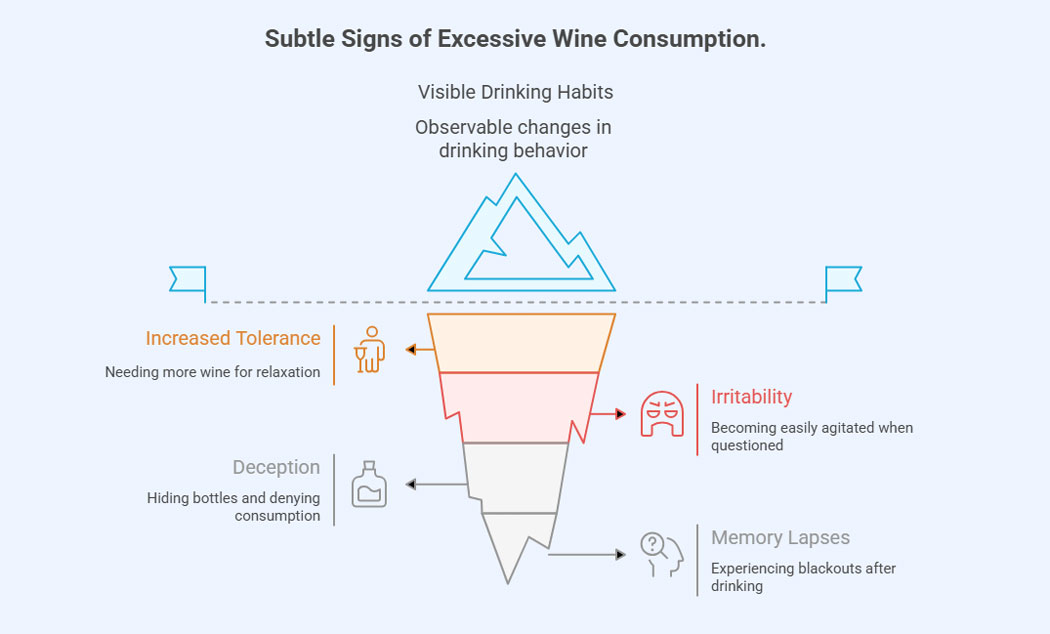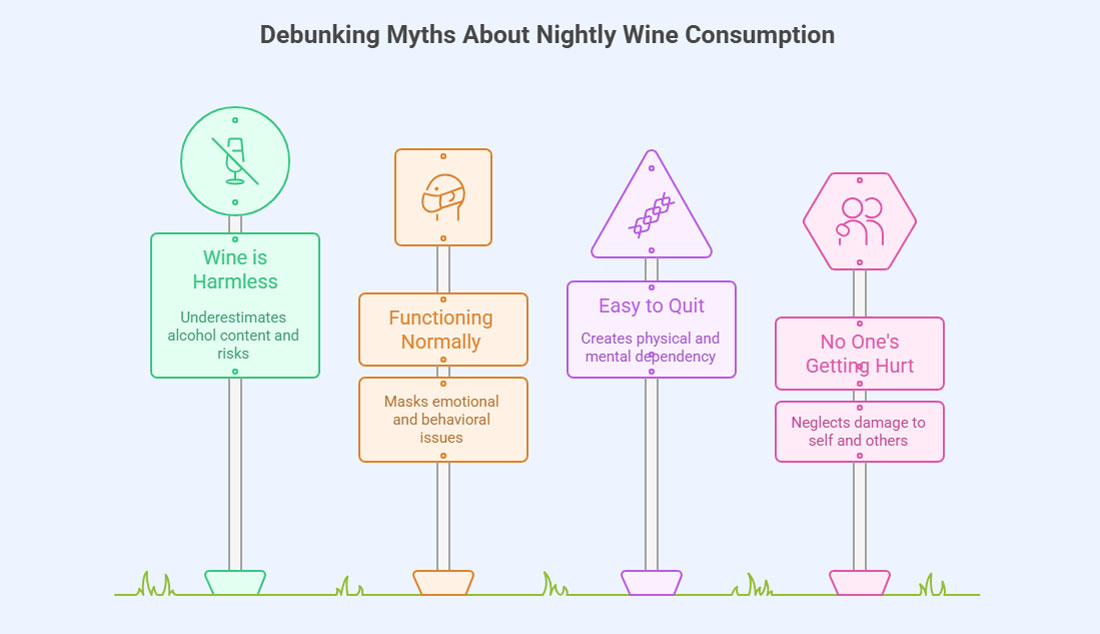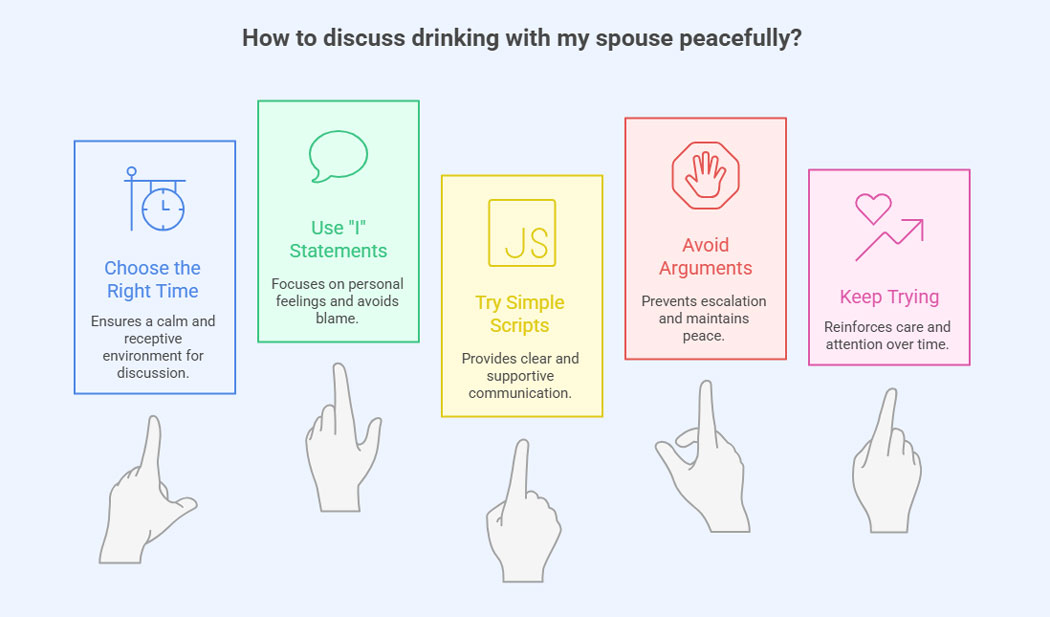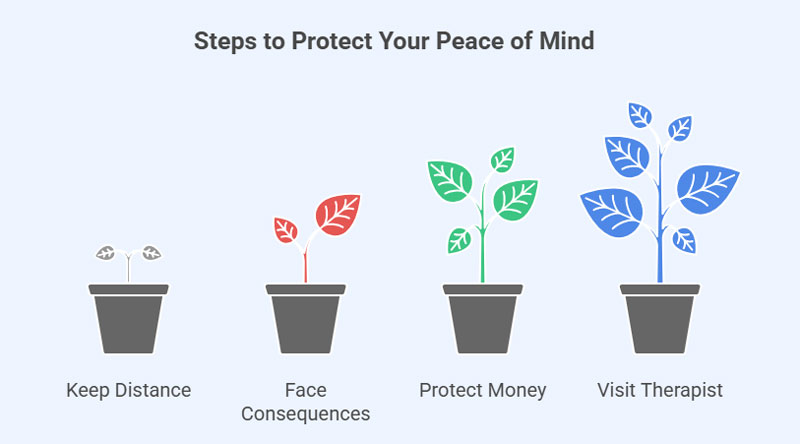“My spouse drinks a bottle of wine every night.” Have you heard a man or woman complain about this? What can happen in a marriage when drinking becomes a nightly routine? Fortunately, such a problem has not touched my own life. However, I’ve seen the devastating impacts of excessive alcohol use on couples and families.
If your spouse drinks a bottle of wine every night, it isn’t just a harmless habit. A daily bottle of wine harms health, creates emotional distance, and hurts your marriage and family. Children notice the mood changes, arguments grow, and your peace fades. Red flags like blackouts, shakiness, or drunk driving mean a crisis is on the way. You cannot control your partner’s choices, but you can protect yourself with clear rules, safety plans, and expert help.
According to the CDC, excessive alcohol use causes nearly 178,000 U.S. deaths each year (almost 59,000 among women). You’ve probably felt the danger and want to understand the reasons, symptoms, and solutions. Stop here, in the right place!
In today’s FamilyApex post, we will walk you through the signs, struggles, and steps to take when your wife or husband drinks too much wine every night.
Stay with us to get everything:
Is Drinking a Bottle of Wine Every Night Bad for My Spouse and Marriage?
Yes. It is. A University of Pennsylvania study of 36,000 adults found that even one to two drinks a day can shrink brain volume. I know you may have heard that wine is relaxing and even beneficial for health, but a 750ml bottle (about 12% alcohol) equals 5-7 drinks, way past safe limits. So, it can threaten his/her health, your marriage, and peace of mind.
Hidden Warning Signs When Your Husband or Wife Drinks Too Much Wine
Everything seems okay about your wife/husband. They go to work, behave in parties as usual, and have an everyday life, but the damage is working behind the surface. There are always subtle warning signs that you should never underestimate, like when s/he:
- Opens a bottle earlier in the day or makes excuses to drink.
- Needs more wine to feel relaxed or to get the same effect.
- Becomes irritable or defensive when asked about drinking.
- Hides bottles or denies how much wine is consumed.
- Has memory gaps or blackouts after drinking.
These signs do not mean there is already a crisis, but they do mean a crisis is on the way! That’s why you should take them seriously.

The Health, Emotional, and Relationship Consequences of Nightly Drinking
Your spouse’s nightly wine consumption harms not only his/her own health, but yours. Take the following negative impacts seriously so that you can plan your steps toward your mental and physical health:
1. Physical Health Risks
The World Health Organization states that no amount of alcohol is safe. A daily bottle of wine means your spouse is exceeding the limitations (7 drinks/week for women, 14 for men). Some of the health risks include:
- Cancers (breast, liver, throat)
- Heart problems (high blood pressure, irregular heartbeat)
- Dependence, with withdrawal symptoms like seizures.
Do not forget that women face greater risks due to biological differences. So you must be more careful if your wife drinks this much wine routinely.
2. Emotional and Relationship Strain
Some routines are changing around you two in your house, just because your spouse keeps drinking too much wine every night. The way that your spouse drinks wine affects you and causes emotional distance. It can grow up and end in arguments, too, making you anxious about your future.
3. Red Flags to Watch For
Certain red flags are warning you, but I guess you are trying not to see them! The signs I mention below should bring your worriness from “maybe” to the “definitely” status:
- Forgetting things or having memory gaps after drinking
- Feeling shaky, sweaty, or cranky in the morning without alcohol
- Drinking while also taking medicines like painkillers or sleeping pills
- Driving after drinking
- Getting hurt or having accidents because of alcohol
4. Effects on Kids and Family
Children are watching you all the time. They understand one of their parents is acting too moody and does not pay enough attention. Your husband/wife is also teaching your little kid bad habits that cause trouble in the future.
| Issue | Signs | Impact | Action |
| Health Risks | Cancers, heart issues, seizures. | Harms body; women at higher risk. | Get a doctor to check your health, plan to quit. |
| Emotional Strain | Arguments, distance, anxiety. | Hurts marriage, your peace. | Use “I” statements; try counseling. |
| Red Flags | Blackouts, shakiness, drunk driving. | Risks safety, health. | Call 911; set no-driving rule. |
| Kids/Family Effects | Moody parent, less attention. | Teaches bad habits, risks safety. | Ensure sober childcare; explain to kids. |
| Medication Risks | Mixing wine with pills. | Can be life-threatening. | Ask the doctor about safe meds. |
Hidden Triggers of Nightly Drinking: Stress, Anxiety, and Habit Loops
Enjoying alcohol can not be the main reason for your spouse to drink a full wine bottle every night. There might be some underlying reasons, and you would better find them. Some common underlying drivers include:
- Stress & Anxiety: A lot of people pour a drink just to relax after a long day or to take the edge off stress.
- Emotional Pain: When someone feels sad, lonely, or is dealing with tough memories, wine can feel like an easy way to improve it.
- When One Glass Becomes a Habit: What starts as “just one glass” can quietly turn into a nightly routine without much thought.
The reason mentioned above can also increase the risk of health issues. Besides, the alcohol combined with certain medications, such as painkillers or sleeping pills, may even be life-threatening. At the same time, your relationship tension increases as the real root causes remain unaddressed.
Healthier Alternatives: Convince your spouse to try stress-reducing habits such as exercise, meditation, and even deep breathing practices. Going for a walk daily will also be helpful.
Myths About Drinking a Bottle of Wine a Night (and Why They’re Wrong)
You may hear excuses constantly from your spouse to underestimate the dangers of excessive wine consumption. These myths can make you doubtful and tell “it’s not that bad!” if you hear the following myths from your husband or wife, DO NOT BELIEVE:
- It’s Just Wine, Nothing Harmful:
You hear “wine is safe, not like beer or other drinks.” A bottle has five or six drinks. That can’t be harmless.
- I’m Fine at Work and at Home:
Many heavy drinkers keep their jobs and look normal. However, lack of patience, a bad temper, and emotional distance indicate a serious problem.
- I Can Quit Drinking Wine Easily:
Wrong! A bottle every night changes the body and mind. It hurts problem-solving and decision-making abilities.
- No One’s Getting Hurt:
You, your family, and your marriage are all getting hurt. Your partner may say “everything is normal,” but it’s not.

Safety Priorities and Boundaries If Your Spouse Drinks Too Much
When you realize that drinking has become a part of your everyday life, you must consider your safety as your paramount priority. Maybe you have no control over your partner’s behaviour, but setting some boundaries and clear rules will change the game. These rules include:
1. Basic Safety Rules
These are the musts. They aren’t optional. They keep everyone safe at the moment. For example:
- Your spouse should not drive after drinking. Take the keys or call a ride.
- Only a sober adult should watch the kids.
- If you ever feel unsafe, leave home right away.
2. Home Safety Checklist
Alcohol can make people careless. Heavy alcohol use is a well-established risk factor for intimate partner violence (Source: National Library of Medicine) Lower the risk of accidents with a few small steps at home:
- Keep medicine, cleaners, and sharp tools out of reach
- Blow out candles before going to bed
- Turn off the stove before going to bed
- Check that all doors are locked at night
- Check that all windows are locked at night
3. Personal Safety Plans
Think ahead. A plan helps you feel less worried and more in control. For example, keep your keys, cash, ID, and papers together so you can take them fast. Keep at least two safe places you can go to in your mind. Consider one or two people you trust and call them if you need help.
4. Boundaries That Protect You
Boundaries don’t stop your spouse from drinking. But they show what you will and won’t accept. They protect your calmness and your kids. Never buy alcohol for your partner yourself. They should also never drink wine at family meals. Consider punishments if they can not follow up.
How to Talk to Your Spouse About Drinking Without Starting a Fight
It’s not easy to talk to your marriage partner about drinking heavily. S/he may become defensive or react angrily. So, for the best result, follow the steps below and ensure you can bring up the matter peacefully:
- Pick the Right Time: Start talking when your spouse is not drunk. Choose a calm moment, not when he is stressed out.
- Use “I” statements and facts: Discuss your feelings and avoid blaming others for the problems.
- Try Simple Scripts: Whether you use a supportive script, like” I care about you”, or a boundary-setting script, like” no driving after drinking,” use simple, straightforward terms.
- Avoid Unhelpful Arguments: Do not try to control your husband and wife. Avoid arguments when they are too emotional.
- Keep Trying: Continue your calm conversations once in a while. Do not stop your care and attention.

Practical Steps If Your Spouse Is Ready to Cut Back on Drinking
Congratulations! That calm conversation with your spouse has opened up the way to get things right again. It seems your husband/wife admits there is something wrong and is determined to give up on drinking, and you must take the following steps to help him/her:
1. Medical Checkup First
The first step can be a doctor’s visit. You must first check how far the damage has gone and find the safest way to quit drinking. This will increase the chances your wife/husband takes the matter more seriously and understands it’s a real issue, not a typical habit.
2. Therapy and Counseling
Therapy is a must-do thing in many cases. Without expert help, they may get back to their bad habits and put your relationship in real danger. The following options help you a lot:
- Cognitive Behavioral Therapy (CBT) helps identify the reasons behind and build coping skills.
- Couples counseling can repair trust and improve communication.
- Support groups such as SMART Recovery Family & Friends, or other peer groups encourage your spouse facing the same challenges.
3. Medications and Alternatives
Some people may need medications in addition to expert help. Do not think that medications worsen the situation. Doctors prescribe them only when necessary. It helps your spouse if quitting seems too big to him/her.
4. Building a Change Plan
Let him/her feel you by their side. Planning things together makes it easier. If you don’t know exactly what to do, have a look at the following list:
- Start with small goals, like fewer drinks each night or some alcohol-free days.
- Write the goals down and decide how you will both stick to them.
- Check the plan regularly and make adjustments as needed.
- Celebrate any progress, even small wins, to stay encouraged.
5. Track Progress and Celebrate Wins
Check in once a week to see how things go. Celebrate small steps, like fewer drinks or more sober nights together. If setbacks happen, talk about them calmly without blame. Focus on steady progress rather than perfection.
Here’s a quick plan to help your spouse drink less wine:
| Action | How It Helps | Why It Matters | Start With |
| Doctor Visit | Checks health risks. | Spots damage, guides quitting. | Book a doctor visit today. |
| Therapy | CBT, couples, or SMART Recovery. | Builds skills, trust, support. | Find a therapist or group. |
| Medications | Meds ease quitting. | Reduces cravings, helps focus. | Ask doctor about meds. |
| Change Plan | Set goals, track together. | Keeps focus, boosts progress. | Pick one sober-night goal. |
| Track Wins | Check weekly, cheer steps. | Encourages small, steady wins. | Plan a weekly check-in. |
A Real-World Story: The Journal Entry That Changed Everything
Problem: Rachel had started drinking a glass of wine after her mother died. A glass of wine turned into a bottle of wine, little by little, until she found herself addicted to it. One night, she reread a journal entry: “I don’t want to lose my kids with my drinking.” That was her wake-up call.
Result: She told her husband that she is tired of drinking this much wine and asked for his help. They started setting goals for themselves and celebrated alcohol free nights together. That wasn’t easy for her to take the first steps, but she was really determined for a big change. I saw Rachel and her husband last week. Their relationship is exemplary now!
Protect Yourself If Your Husband or Wife Won’t Stop Drinking Wine
Suppose your husband/wife is not ready to give up on drinking wine; it’s hard, but it’s time to make decisions. Your peace of mind is valuable, and you must protect it with all your heart. How? You ask? Take the steps below:
- Keep distance: do not make excuses for their faults. You have put too much effort, and that’s enough.
- Let Him/Her Face the Consequences: If they are going to miss their job or anything else, you can’t save them.
- Protect Your Money: Have a bank account for saving, and do not waste this money on more bottles of wine!
- Visit a Therapist: If you are visiting a therapist alone, please do so without your companion. Protect your soul and do not let yourself down.

Crisis Playbook: What to Do When Drinking Leads to Emergencies
When your spouse drinks too much wine nightly, it means you must always be cautious about the consequences, which can even include a real crisis. Below, I will explain what the best reaction is in such situations:
1. During a Crisis
Try not to stay and continue a pointless argument when s/he is drunk. Just keep away. You can even leave home, go to a friend’s house, or stay the night in a hotel if you are in danger. In case of an emergency, call 911 and do not interfere.
2. After Something Bad Happens
Record everything that happened in detail. Write down everything with date and time. That helps you to prove when the police come. If s/he passed out or got shaky, get a doctor without killing time. Keep dangerous medications or dangerous stuff, such as knives, out of reach. Keep yourself safe.
3. When Legal Help is Needed
The conflict sometimes ends up in a real crisis that requires legal help. For instance, driving while drunk can even send your spouse to jail. Or, serving wine at parties could break “host” laws if someone gets hurt. In these cases, you can get legal help like this:
- Talk to a lawyer if kids or safety are in danger. They can guide you on keeping everyone safe.
- Ask about protecting money or custody. A lawyer can help secure your savings or your kids’ rights.
- Bring records to show the harm. Notes or receipts prove how drinking affects your family.
4. Review and Update Your Plan
After those scary moments, take your time to think. Figure out what went wrong. Maybe you need stricter rules, like no alcohol at home. Update your safety plan with new steps, like hiding bottles of wine or calling a counselor. Check your plan every week to keep things right.
A Real-World Story: When a Glass of Wine Turns Into a Crisis
I met Mia and Jason at the therapist’s clinic for the first time. They were married for 10 years, but their marriage was nearly broken.
Problem: Mia saw her husband’s one glass of wine each night had turned into whole bottles. One evening, he came home drunk, shouting and breaking things. Mia took their daughter and left the house. The next morning, she wrote everything down, times, photos, and messages from a friend who saw what happened. Later, Jason was caught driving drunk, which forced Mia to get legal help.
Result: That was the first point Jason decided to give up on drinking. He started treatment with difficulty, but his family was more important than everything else to him. Mia, Jason, and their lovely daughter live happily together now.
The Wrap-Up
If your spouse drinks a bottle of wine every night, it isn’t just a harmless habit. Such a habit will threaten his/her health, ruin your marriage, and put your family in danger. It can start at the point “just relaxing” but end up in a crisis. That’s why you must be careful about the early signs, detect the underlying triggers, get expert or even legal help, and take strict rules and boundaries into consideration.
Remember, you cannot control your partner’s choices, but you can protect your own well-being and create an environment that encourages healthier paths. Sharing your valuable experience will help us at Family Apex give more and more people in your situation a real hand. Stay in touch.
Frequently Asked Questions (FAQs)
1- Is a bottle of wine a night alcoholism?
A 750ml bottle equals 5–7 drinks, far past safe limits. Even one to two drinks a day can shrink brain volume.
2- If she’s fine at work, is it really a problem?
Yes. Many heavy drinkers keep jobs but show hidden warning signs like memory gaps, irritability, or emotional distance.
3- Can I make him/her stop?
No. You cannot control your partner’s choices, but you can protect yourself with clear rules: no driving after drinking, only a sober adult should watch the kids, and never buy alcohol for your partner.
4- Is cutting down worth it if she won’t quit?
Yes. Start with small goals, like fewer drinks each night or some alcohol-free days. Celebrate any progress, even small wins.
5- How do I bring up medication or moderation without a fight?
Talk when s/he’s sober and calm. Use “I” statements and simple scripts like “I care about you.”
6- When is leaving the right call?
Red flags include blackouts, drunk driving, mixing alcohol with pills, or becoming threatening at home. If safety, kids, or peace are at risk, it’s time to leave.



